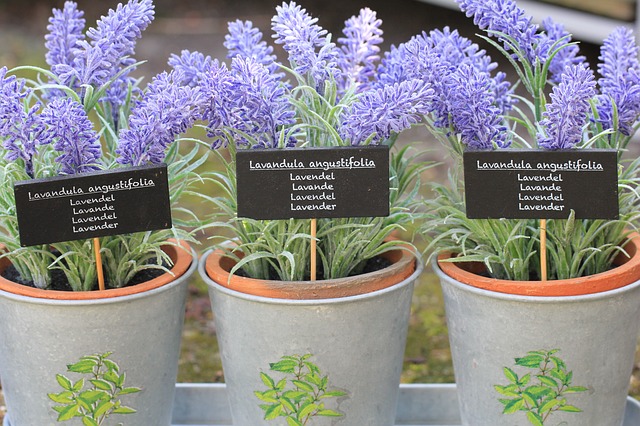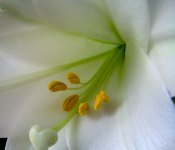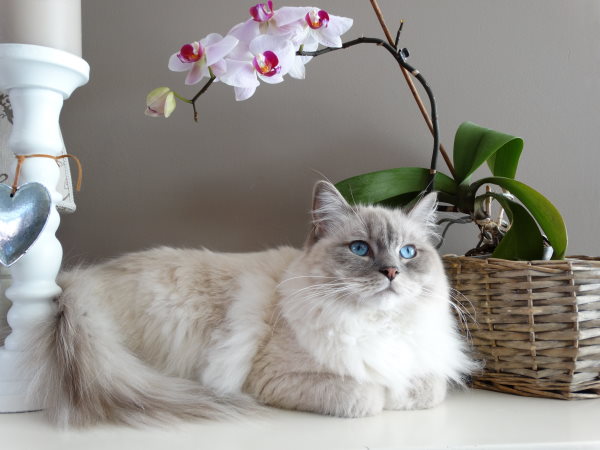How to Grow Lantana Plants
Botanical Name: Lantana camara
Colorful flower clusters have long made lantana plants a favorite for flower beds and borders. They've made their way indoors, delighting indoor gardening enthusiasts. Small plants are a beautiful sight in a sunny window.
Caring for lantana plants is easy. With the right sunlight, water, pinching and pruning, lantana will bloom nearly year-round, making it a captivating houseplant.
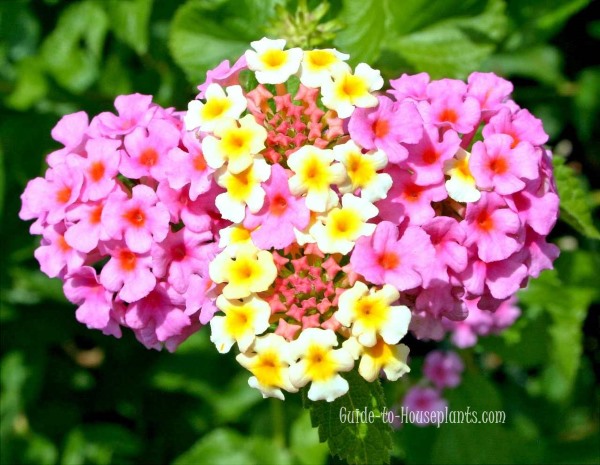 Sunshine is the key to lots of lantana flowers. A sunny porch gives it more blooming power.
Sunshine is the key to lots of lantana flowers. A sunny porch gives it more blooming power.Get to Know Lantana Plants
The Lantana genus is in the verbena family (Verbenaceae) and includes 150 species of flowering perennials. Lantana camara is by far the most cultivated species and includes 100s of spectacular cultivars to choose from.
Flower clusters, called umbels, are available in a range of yellow, orange, red, white, pink, lavender and purple. Two or three colors are often present on each flower head with the flower buds opening in succession from the outside ring toward the center.
The ovate, toothed leaves are dark-green and deeply veined. Lantana leaves are slightly toxic, so take care when growing these flowers, lantana can cause illness if ingested. It's a good idea to wear gloves when handling lantana; its leaves may cause skin irritation.
Beautiful, yet imposing: Lantana plant is fast-growing and can be invasive if grown in the garden. That's another good reason to grow it in a pot.
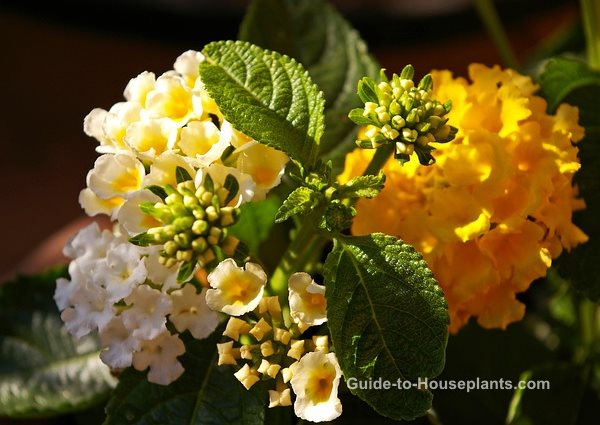 Lantana is a prolific bloomer in a sunny window, giving a big show of color for several months.
Lantana is a prolific bloomer in a sunny window, giving a big show of color for several months.Buy Lantana Plants
You can buy lantana plants and seeds in garden centers or online nurseries. Countless varieties are available.
Lantana camara 'Sundancer' is a yellow lantana cultivar with a spreading habit suitable for a hanging basket. 'Chelsea Gem' has yellow, orange and orange-red flowers...'Patriot Hot Country' is stunning in pink, orange and bright yellow...'Patriot Cowboy' lantana is compact, reaching about 1 ft (30 cm) high, and is a prolific bloomer with yellow flowers that turn bright orange.
Year-Round Lantana Tips
Pinch and prune. Pinch off growing tips to keep lantana compact and to encourage branching. Some cultivars are compact and may not need pinching at all. Pruning lantana in late winter will bring more blooms. Cut stems back to about 5 in (13 cm).
Deadhead spent blooms to encourage more flowers. You can keep your lantana blooming for months on end as long as it gets enough sunlight.
Repot in spring when the roots are growing through the bottom of the pot. Move up to a pot only 1 size larger. Lantana flowers best when slightly pot-bound. Remember to use a pot with drainage holes to prevent soggy potting mix, which can lead to root rot.
Watch for whiteflies that like to attack lantana plants. You'll find these tiny, white moth-like insects lurking under leaves. Get rid of whiteflies as soon as you notice them because they multiply quickly.
Overwinter your plant. Lantanas are evergreen, but frost-tender. Bring your potted lantana plants indoors when the temperature drops in autumn, and you'll enjoy those colorful flowers a little longer. When flowering is over, give it a rest. Continue to give it lots of sun and keep it cool (about 50°F/10°C) in winter. Water sparingly, just enough to prevent the potting mix from drying out.
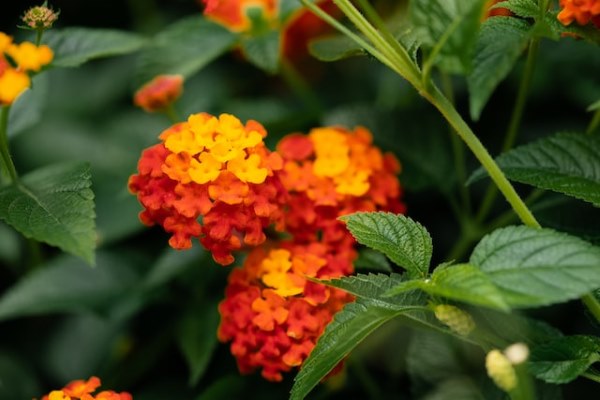 Lantana camara offers a dazzling display of color. Photo credit: Jeremy Horvatin
Lantana camara offers a dazzling display of color. Photo credit: Jeremy HorvatinLantana Plant Care
Origin: Central and South America
Height: Up to 6 ft (1.8 m); Easily kept to 1 ft (30 cm) indoors with regular pinching and pruning lantana.
Light: Bright light to full sun. At least 6 hours of direct sunlight will make lantana flower. Keep your plant in a sunny window or move it outdoors for the summer to give it the light it needs to bloom. Their scented blossoms are attractive to butterflies, too, if you choose to move lantana to your porch or patio for the summer.
Water: Keep soil evenly moist, not soggy spring through fall; slightly drier in winter. Established plants will tolerate drier soil.
Humidity: Moderate to high (around 50% relative humidity or higher). Stand pot on a tray of wet pebbles or use a cool-mist room humidifier to increase humidity near your houseplant.
Temperature: Normal room temperatures 60-75°F/16-24°C suit these tropical beauties. Lantana plants are cold-hardy to USDA Zone 9, if you put them outdoors.
Soil: Peat moss based potting mix, such as African violet potting mix.
Fertilizer: Feed every 2 weeks with a liquid or water-soluble fertilizer diluted by half while plant is growing.
Propagation: Take stem tip cuttings in spring or early summer. They'll root easily in moist soil. Lantana seeds are easy to germinate. If you want to collect seeds from your plant, allow some flowers to go to seed in the fall. Store seeds in a cool, dry place then sow them indoors in early spring.
